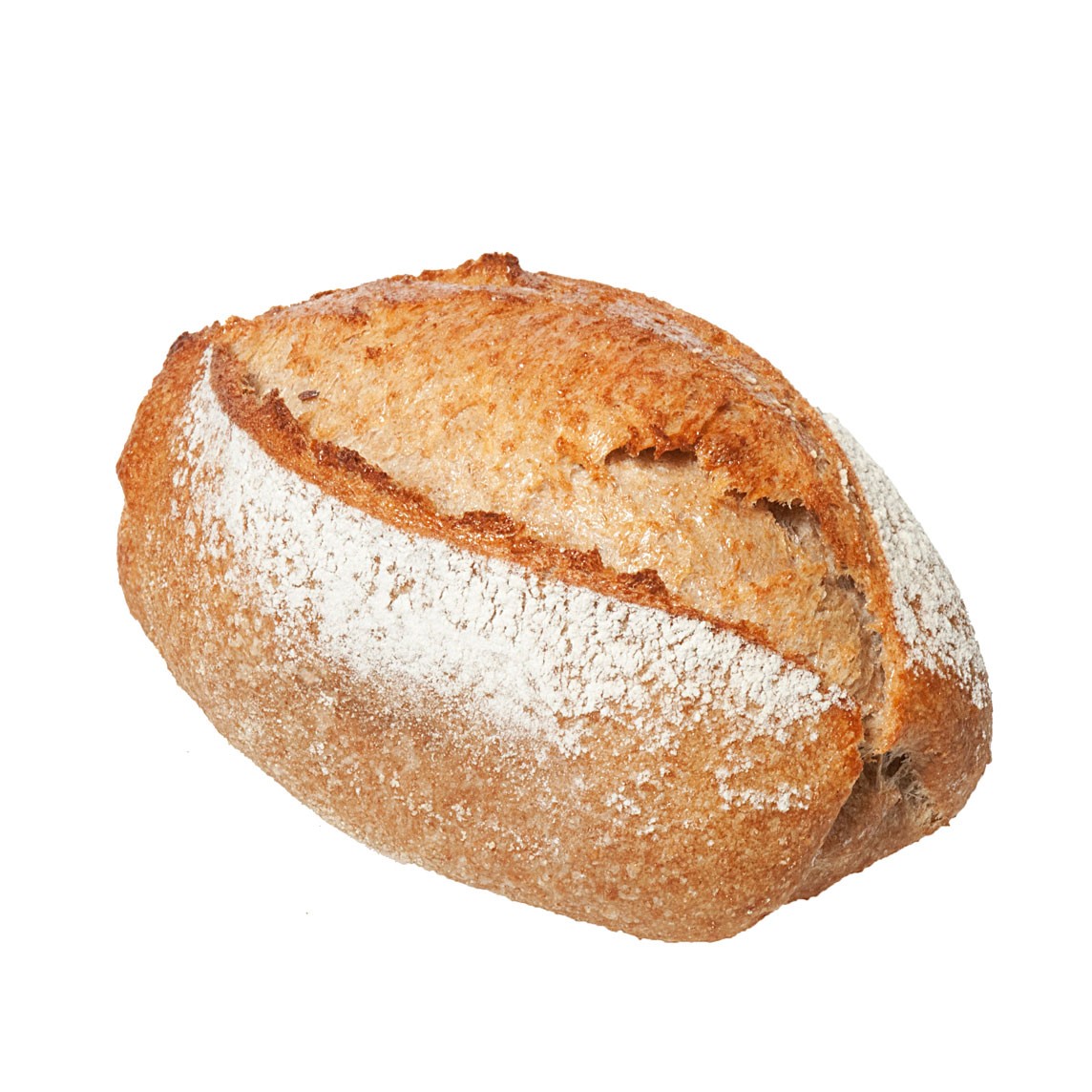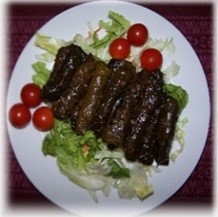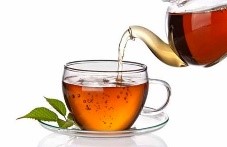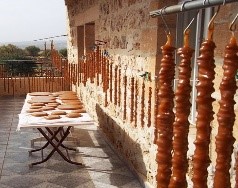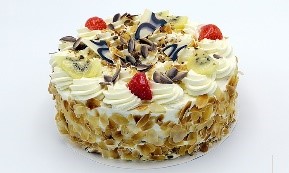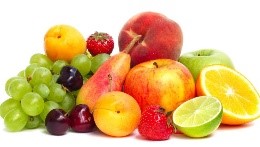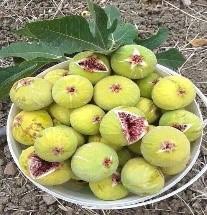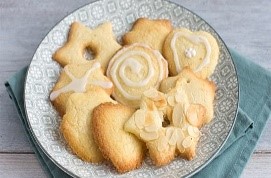| Aṯi yawme d šabṯo. Be Malke aṯën. Tring-tring, komidaq u zago. |
It was Saturday. The Malke family came over. Ding, dong, the doorbell rings. |
ܐܰܬ݂ܝ ܝܰܘܡܶܗ ܕܫܰܒܬ݂ܐ. ܒܶܐ ܡܰܠܟܶܐ ܐܰܬ݂ܷܢ. ܬܪܝܢܓ-ܬܪܝܢܓ، ܟܳܡܝܕܰܩ ܐܘ ܙܰܓܐ. |
| I Ḥana kofëtḥo u tarco. “Toxu cbaru, b šayno w bë šlomo aṯitu“, këmmo i Ḥana. |
Ḥana opens the door. „Please come in, you are most welcome!“, says Ḥana. |
ܐܝ ܚܰܢܰܐ ܟܳܦܷܬܚܐ ܐܘ ܬܰܪܥܐ. ܬܳܟ݂ܘ ܥܒܰܪܘ، ܒܫܰܝܢܐ ܘܒܷܫܠܳܡܐ ܐܰܬ݂ܝܬ݂ܘ، ܟܷܐܡܡܐ ܐܝ ܚܰܢܰܐ. |
| Koquryo lu gawrayḏa, “Be Malke ne.” |
She says to her husband: „The Malke family is here!“ |
ܟܳܩܘܪܝܐ ܠܘ ܓܰܘܪܰܝܕ݂ܰܗ: ܒܶܐ ܡܰܠܟܶܐ ܢܶܐ. |
| “Ġäläbe ṭawwo, kaṯino”, komar u Barṣawmo. |
„Great, I'm coming“, says Barṣawmo. |
ܓ݂ܱܠܱܒܶܐ ܛܰܘܘܐ، ܟܰܐܬ݂ܝܢܐ، ܟܳܐܡܰܪ ܐܘ ܒܰܪܨܰܘܡܐ. |
| Be Malke kocëbri lawġël, kodorën šlomo w košëlḥi aš šakkalaṯṯe. |
The Malkes come in, greet and take off their shoes. |
ܒܶܐ ܡܰܠܟܶܐ ܟܳܥܷܒܪܝ ܠܰܘܓ݂ܷܠ. ܟܳܕܳܪܷܢ ܫܠܳܡܐ ܥܰܠ ܚܕ݂ܳܕ݂ܶܐ ܘܟܳܫܷܠܚـܝ ܐܰܫ ܫܰܟܟܰܠܰܬ݂ܬ݂ܶܗ. |
| I Ḥana w i Šmuni koḥëḏni ḥḏoḏe ḥiṣo, miḏe d me zawno lo ḥzalle ḥḏoḏe. |
Ḥana and Šmuni hug each other firmly as they haven't seen each other for a long time. |
ܐܝ ܚܰܢܰܐ ܘܐܝ ܫܡܘܢܝ ܟܳܚܷܕ݂ܢܝ ܚܕ݂ܳܕ݂ܶܐ ܚܝܨܐ، ܡܝܕ݂ܶܗ ܕܡܶܐ ܙܰܘܢܐ ܠܐ ܚܙܰܠܠܶܗ ܚܕ݂ܳܕ݂ܶܐ. |
| Heš cal ar raġle komšayli bu šlomo dë ḥḏoḏe w bëṯër koyëtwi. |
While still standing, they ask about each other's well-being and then sit down. |
ܗܶܫ ܥܰܠ ܐܰܪ ܪܰܓ݂ܠܶܐ ܟܳܡܫܰܝܠܝ ܒܘ ܫܠܳܡܐ ܕܷܚܕ݂ܳܕ݂ܶܐ ܘܒܷܬ݂ܷܪ ܟܳܝܷܬܘܝ. |
| I Ḥana komšaylo: “Mën këbcitu šotitu, meqëm d ḥëḏro i ḥšamto?” |
Ḥana asks: „What would you like to drink before dinner is ready?“ |
ܐܝ ܚܰܢܰܐ ܟܳܡܫܰܝܠܐ: ܡܷܢ ܟܷܐܒܥܝܬܘ ܫܳܬܝܬܘ ܡܶܩܷܡ ܕܚܷܕ݂ܪܐ ܐܝ ܚܫܰܡܬܐ؟ |
| I Šmuni këbco koso d čaye. U Malke w u Barṣawmo koṭëlbi qaḥwa. |
Šmuni wants a cup of tea. Malke and Barṣawmo order a coffee. |
ܐܝ ܫܡܘܢܝ ܟܷܐܒܥܐ ܟܳܣܐ ܕܫ̰ܰܝܶܐ. ܐܘ ܡܰܠܟܶܐ ܘܐܘ ܒܰܪܨܰܘܡܐ ܟܳܛܷܠܒܝ ܩܰܚܘܰܐ. |
| “Ḥana, kibi mcawnallax?”, këmmo i Šmuni. “Lo kolozam, elo d ëbcat tax ëšmo mëjġolina.” |
„Ḥana can I help you?“, Šmuni says. „No, it's not needed, but if you want, let's chat a little.“ |
ܚܰܢܰܐ، ܟܝܒܝ ܡܥܰܘܢܰܠܠܰܟ݂؟ ܟܷܐܡܡܐ ܐܝ ܫܡܘܢܝ. ܠܐ ܟܳܠܳܙܰܡ، ܐܶܠܐ ܕܐܷܒܥܰܬ ܬܰܟ݂ ܡܷܔܓ݂ܳܠܝܢܰܐ. |
| “Mën muklo semlax Ḥana?”, komšaylo i Šmuni. |
„What did you cook Ḥana?”, asks Šmuni. |
ܡܷܢ ܡܘܟܠܐ ܣܷܡܠܰܟ݂ ܚܰܢܰܐ؟ ܟܳܡܫܰܝܠܐ ܐܝ ܫܡܘܢܝ. |
| “Ašër sëmli muklo Suryoyo. Qamayto abicono d saymono kutle, hurëk latwa bi dukano. Abicono d saymono apraxe, ṭarfe raġye das sate latwayli”, mërla i Ḥana. |
„To be honest, I have cooked Syriac food. At first, I wanted to make kutle, but there was no fine wheat groats in the shop. I wanted to make stuffed vine leaves, I did not have fresh vine leaves“, said Ḥana. |
ܐܰܫܷܪ ܣܷܡܠܝ ܡܘܟܠܐ ܣܘܪܝܳܝܐ. ܩܰܡܰܝܬܐ ܐܰܒܝܥܳܢܐ ܕܣܰܝܡܳܢܐ ܟܘܬܠܶܐ، ܗܘܪܷܟ ܠܰܬܘܰܐ ܒܝ ܕܘܟܰܢܐ. ܐܰܒܝܥܳܢܐ ܕܣܰܝܡܳܢܐ ܐܰܦ݁ܪܰܟ݂ܶܐ، ܛܰܪܦܶܐ ܪܰܓ݂ܝܶܐ ܕܰܣ ܣܰܬܶܐ ܠܰܬܘܰܝܠܝ، ܡܷܪܠܰܗ ܐܝ ܚܰܢܰܐ. |
| “Mawxa sëmli labaniye du qaṭiro, bërġël, marga w zälaṭa dar rucye. Štoyo ste këtli maye daf fire, bira w ḥamro. Cam sabro d rëḥmitu u mede d sëmli.” |
„That's why I cooked yoghurt soup with wheat, bulgur, marga stew and shepherd salad. To drink, I have fruit juices, beer and wine. I hope you will like what I have prepared.“ |
ܡܰܘܟ݂ܰܐ ܣܷܡܠܝ ܠܰܒܰܢܝـܝܶܐ ܕܘ ܩܰܛܝܪܐ، ܒܷܪܓ݂ܷܠ، ܡܰܪܓܰܐ ܘܙܱܠܰܛܰܐ ܕܰܪ ܪܘܥܝܶܐ. ܫܬܳܝܐ ܣܬܶܐ ܟܷܬܠܝ ܡܰܝܶܐ ܕܰܦ ܦܝܪܶܐ، ܒܝܪܰܐ ܘܚܰܡܪܐ. ܥܰܡ ܣܰܒܪܐ ܕܪܷܚܡܝܬܘ ܐܘ ܡܶܕܶܐ ܕܣܷܡܠܝ. |
| “Layt furšono, u muklo Suryoyo kule basimo yo. Tawdi li tacbayḏax, Ḥana”, mërla i Šmuni. |
„Doesn’t matter, all Syriac dishes taste good, thank you for your effort, Ḥana“, said Šmuni. |
ܠܰܝܬ ܦܘܪܫܳܢܐ، ܐܘ ܡܘܟܠܐ ܣܘܪܝܳܝܐ ܟܘܠܶܗ ܒܰܣܝܡܐ ܝܐ. ܬܰܘܕܝ ܠܝ ܬܰܥܒܰܝܕ݂ܰܟ݂، ܚܰܢܰܐ، ܡܷܪܠܰܗ ܐܝ ܫܡܘܢܝ. |
| “Latyo mede, b šayno w bë šlomo apxu”. |
„not at all, you are most welcome!“ |
ܠܰܬܝܐ ܡܶܕܶܐ، ܒܫܰܝܢܐ ܘܒܷܫܠܳܡܐ ܐܰܦ݁ܟ݂ܘ. |
| “U muklo ḥaḏër, fquḏu”, këmmo i Ḥana. |
„The food is ready, please have a seat!“, says Ḥana. |
ܐܘ ܡܘܟܠܐ ܚܰܕ݂ܷܪ، ܦܩܘܕ݂ܘ، ܟܷܐܡܡܐ ܐܝ ܚܰܢܰܐ. |
| U Barṣawmo w u Malke qayimi. |
Barṣawmo and Malke stood up. |
ܐܘ ܒܰܪܨܰܘܡܐ ܘܐܘ ܡܰܠܟܶܐ ܩܰܝـܝܡܝ. |
| At tarte iqaryoṯe yatiwi cam ḥḏoḏe cal u muklo. |
Both families sit down to have dinner together. |
ܐܰܬ ܬܰܪܬܶܐ ܐܝܩܰܪܝܳܬ݂ܶܐ ܝܰܬܝܘܝ ܥܰܡ ܚܕ݂ܳܕ݂ܶܐ ܥܰܠ ܐܘ ܡܘܟܠܐ. |
| Mšaralle d uxli w mëjġoli cal ay yawme w cal u zabno d mašfacce b Mëḏyaḏ. |
They start eating and chatting about the old days and times that they spent in Midyat. |
ܡܫܰܪܰܠܠܶܗ ܕܐܘܟ݂ܠܝ ܘܡܷܔܓ݂ܳܠܝ ܥܰܠ ܐܰܝ ܝܰܘܡܶܐ ܘܥܰܠ ܐܘ ܙܰܒܢܐ ܕܡܰܫܦܰܥܥܶܗ ܒܡܷܕ݂ܝܰܕ݂. |
| Maclalle ak kose du ḥamro w mërre: “Ḥubo w ḥulmono!” |
They raised the wine glasses and said: „Love and health!“ |
ܡܰܥܠܰܠܠܶܗ ܐܰܟ ܟܳܣܶܐ ܕܘ ܚܰܡܪܐ ܘܡܷܪܪܶܗ: ܚܘܒܐ ܘܚܘܠܡܳܢܐ! |


